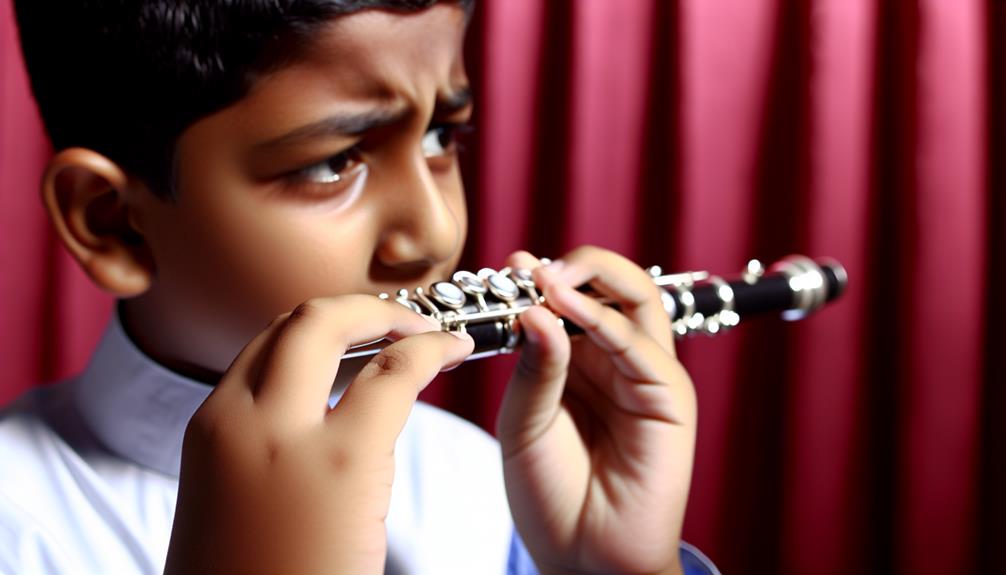Exploring the world of music through playing an instrument can be a rewarding journey for individuals of all ages. When it comes to the flute, many wonder if a 12-year-old is capable of mastering this elegant instrument.
The answer lies not only in the age of the individual but also in their dedication, commitment, and support system. While young learners may face certain challenges, the benefits and joys of learning to play the flute at a tender age are numerous.
Understanding the nuances of this musical endeavor can pave the way for a fulfilling and enriching experience.
Key Takeaways
- Learning flute at 12 enhances cognitive abilities and fosters a sense of belonging.
- Proper guidance and consistent practice routines are crucial for young flute beginners.
- Choosing the right flute size ensures comfort and proper technique for young players.
- Regular practice is essential for skill development, confidence, and musical expression in young flutists.
Benefits of Learning Flute at 12
Learning the flute at the age of 12 offers numerous benefits that contribute to cognitive development and musical proficiency. At this age, children are at a critical stage of development where they are eager to explore new skills and interests. Playing the flute can enhance their cognitive abilities, such as improved memory, concentration, and problem-solving skills. Moreover, mastering the flute requires discipline and perseverance, qualities that can positively impact a young individual's character and sense of achievement.
Engaging in flute lessons at 12 not only fosters musical proficiency but also provides a sense of belonging and community. Playing an instrument like the flute allows young learners to connect with others who share similar interests, leading to friendships and a sense of camaraderie. This social aspect of learning the flute can boost confidence and self-esteem in 12-year-olds, as they feel supported and encouraged by their peers and instructors.
Tips for Young Flute Beginners
Embarking on the journey of learning to play the flute at a young age brings with it the need for essential tips to guide young beginners effectively. For young flute enthusiasts, establishing a consistent practice routine is key to progress. Setting aside dedicated time each day for practice helps build discipline and improves skills steadily.
Additionally, finding a qualified flute instructor who specializes in teaching young students can make a significant difference in the learning process. A good teacher can provide personalized guidance, correct mistakes early on, and offer encouragement to keep young players motivated.
Another crucial tip for young flute beginners is to focus on developing proper posture and breathing techniques from the start. Good posture ensures better airflow and sound production while preventing discomfort or injury. Learning how to breathe properly and control airflow is fundamental to producing clear and resonant notes. Young players should also pay attention to hand positioning and finger placement to facilitate smooth and efficient playing.
Lastly, staying patient, persistent, and open to feedback are essential attitudes for young flute learners to cultivate as they navigate the challenges and joys of mastering this beautiful instrument.
Choosing the Right Flute Size
Selecting the appropriate flute size is a critical consideration for young players starting their musical journey. The right flute size ensures comfort, proper technique, and optimal sound production. For young players, especially 12-year-olds, it is essential to choose a flute that fits comfortably in their hands and allows them to reach all keys easily. A flute that is too large or too small can lead to discomfort, poor posture, and difficulty in playing.
When selecting a flute size for a 12-year-old, it is important to consider their arm length, hand size, and physical strength. A flute that is too long may strain their arms, while a flute that is too short may cause cramped fingers. Finding the right balance is key to fostering a positive playing experience and encouraging musical development.
Consulting with a music teacher or flute specialist can help in determining the appropriate flute size for a 12-year-old player. Trying out different sizes and models before making a final decision is recommended to ensure the young player feels confident and comfortable with their instrument choice.
Importance of Regular Practice
Regular practice is a fundamental aspect of developing proficiency in playing the flute, particularly for young musicians like 12-year-olds. Consistent practice not only helps in mastering the technical skills required but also fosters discipline and commitment in young flutists. Below is a table outlining the benefits of regular practice for young musicians:
| Benefits of Regular Practice | Description | Example |
|---|---|---|
| Improves Technique | Regular practice enhances finger coordination and breath control. | Practicing scales daily improves finger agility. |
| Builds Confidence | Mastery through practice boosts self-assurance during performances. | Playing a challenging piece flawlessly in a recital. |
| Enhances Musicality | Regular practice refines interpretation and expression of musical pieces. | Adding dynamics and phrasing nuances to a melody. |
| Establishes Routine | Consistent practice schedules create a structured approach to learning. | Setting aside time each day for flute practice. |
Engaging in regular practice not only accelerates musical progress but also instills valuable life skills that can benefit young flutists in various aspects of their lives.
Finding a Flute Teacher
Securing a knowledgeable and experienced flute teacher is essential for young musicians looking to cultivate their skills and proficiency in playing the flute. A good flute teacher can provide guidance, support, and structured lessons that cater to the specific needs of a young student. Here are three key reasons why finding the right flute teacher is crucial for a 12-year-old aspiring flutist:
- Personalized Instruction: A skilled flute teacher will be able to assess the student's current level of playing and tailor lessons to address areas that need improvement, helping the young musician progress effectively.
- Motivation and Encouragement: A supportive flute teacher can inspire and motivate a young student to practice regularly and strive for excellence, creating a positive learning environment that fosters growth and development.
- Building a Strong Foundation: A dedicated flute teacher can help lay a solid foundation in music theory, technique, and performance skills, setting the young flutist on a path towards musical success and fulfillment.
Frequently Asked Questions
Can a 12-Year-Old Play Flute if They Have No Prior Musical Experience?
With dedication and proper guidance, a 12-year-old can learn to play the flute even without prior musical experience. Starting with basic techniques and consistent practice, they can develop their skills and enjoy playing music.
Are There Any Health Risks Associated With Playing the Flute at a Young Age?
Playing the flute at a young age can enhance cognitive abilities and motor skills. However, improper technique or extended practice without breaks may lead to overuse injuries like tendonitis. Regular breaks, proper posture, and guidance from a skilled instructor can mitigate these risks.
How Long Does It Typically Take for a 12-Year-Old to Become Proficient at Playing the Flute?
Proficiency in playing the flute can vary depending on individual dedication, practice consistency, and natural aptitude. Typically, a 12-year-old can become proficient after a few years of regular practice, guidance from a skilled instructor, and a strong foundation in music theory.
Are There Any Specific Challenges or Obstacles That 12-Year-Olds Face When Learning to Play the Flute?
When learning to play the flute, 12-year-olds may encounter challenges such as developing proper embouchure, breath control, and fingering technique. Patience, consistent practice, and guidance from a skilled instructor can help overcome these obstacles and foster progress in their musical journey.
Can Playing the Flute at a Young Age Have a Negative Impact on a Child's Academic Performance or Social Life?
Playing the flute at a tender age may not inherently hinder academic or social growth. As with any endeavor, balance is key. Encouraging a child's passion while maintaining a holistic approach to development is vital.
Conclusion
In conclusion, learning to play the flute at 12 can provide numerous benefits such as improved cognitive skills and creativity.
By following tips for young beginners, choosing the right flute size, practicing regularly, and finding a skilled teacher, a 12 year old can excel in playing the flute.
Embrace the opportunity to explore the world of music and unlock your potential through the beautiful art of flute playing.

